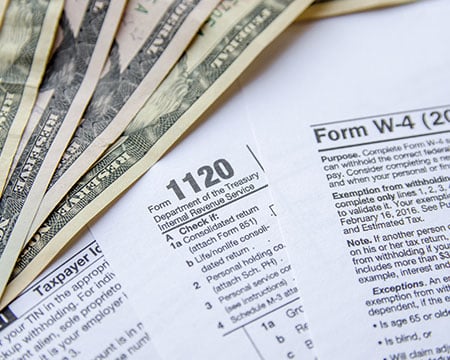Foreign corporations, including foreign corporations operating through LLCs, with gross income effectively connected to a U.S. trade or business are subject to U.S. taxation and reporting. Foreign corporations must report such activity on Form 1120-F. For purposes of computing U.S. taxable income, foreign corporations are generally permitted to arrive at net taxable income by taking into account allowable deductions and credits. However, such deductions and credits are subject to Treas. Reg. 1.882-4(a)(3)(i), which generally requires Form 1120-F be filed within 18 months of the due date of the tax return.
However, Forms 1120-F filed 18 months after the due date of the return are generally subject to IRS disallowance of deductions and credits. Therefore, prior to filing delinquent Forms 1120-F, it is imperative to determine the extent of such delinquency. If the deductions and credits are subject to potential disallowance, the taxpayer may be eligible to file a reasonable cause statement with their delinquent Form 1120-F to hopefully avoid the unfavorable tax consequences.
Due Dates
The due date for filing Form 1120-F depends on whether a foreign corporation maintains a U.S. place of business. If a foreign corporation maintains a fixed place of business, Form 1120-F is due on the 15th day of the 3rd month after the end of its tax year. If a foreign corporation does not maintain a U.S. place of business, Form 1120-F is due on the 15th day of the 6th month after the end of its tax year.
Protective Returns
Foreign corporations who are uncertain as to whether they are required to file a U.S. tax return, or uncertain as to whether their income is effectively connected to a U.S. trade or business, may file a protective Form 1120-F by checking the “Protective Return” box on Form 1120-F and providing the information as required in the instructions (Protective Return). Filing a Protective Return operates to preserve the right to claim deductions and credits should the IRS later assert that the foreign corporation does have a U.S. filing requirement, after the 18-month window has passed.
A Protective Return is also recommended for foreign corporations that determine they do not have a U.S. permanent establishment (a taxable presence) in the U.S. under an applicable U.S. tax treaty. In this case, such foreign corporations are generally required to file a Treaty Based Return Position (Form 8833) with Form 1120-F to assert the treaty claim. Timely filing a Protective Return preserves the foreign corporation’s right to offset income with allowable deductions should the IRS subsequently assert the company does have a taxable U.S. permanent establishment.
Swallows Case
A case which highlights the importance of timely filing Form 1120-F in a manner prescribed by regulations is Swallows Holding, Ltd. V. Commissioner, 101 AFTR 2d 2008-876. Swallows was a Barbados company that owned real estate in the U.S. Swallows filed a timely Form 1120-F for their first year and reported no activity, however, future year Forms 1120-F were not timely filed. The taxpayer subsequently filed the delinquent Forms 1120-F, reporting gross rents, the usual real estate deductions, including real estate taxes, and state franchise taxes. Upon audit, the IRS disallowed the deductions since the returns were filed more than 18 months after the original due date. The Swallows case eventually reached the 3rd Circuit, which determined that the IRS correctly disallowed the deductions. The result was that the Barbados company paid U.S. tax on gross income rather than on income after the deductions—a disastrous scenario.
Seeking Relief
Foreign corporations who fail to file Form 1120-F within 18 months of the due date of such return may generally seek relief from the commissioner. For this purpose, as prescribed under Treas. Reg. 1.882-4(a)(3)(ii), the commissioner will consider the following when determining whether relief shall be granted:
- Whether the corporation voluntarily identifies itself to the Internal Revenue Service as having failed to file a U.S. income tax return before the Internal Revenue Service discovers the failure to file
- Whether the corporation did not become aware of its ability to file a protective return
- Whether the corporation had not previously filed a U.S. income tax return
- Whether the corporation failed to file a U.S. income tax return because, after exercising reasonable diligence (taking into account its relevant experience and level of sophistication), the corporation was unaware of the necessity for filing the return
- Whether the corporation failed to file a U.S. income tax return because of intervening events beyond its control
- Whether other mitigating or exacerbating factors existed
If you have questions regarding Form 1120-F, protective returns, or IRS deductions and credits, contact your local Eide Bailly professional or a member of our International Tax team for more information.

